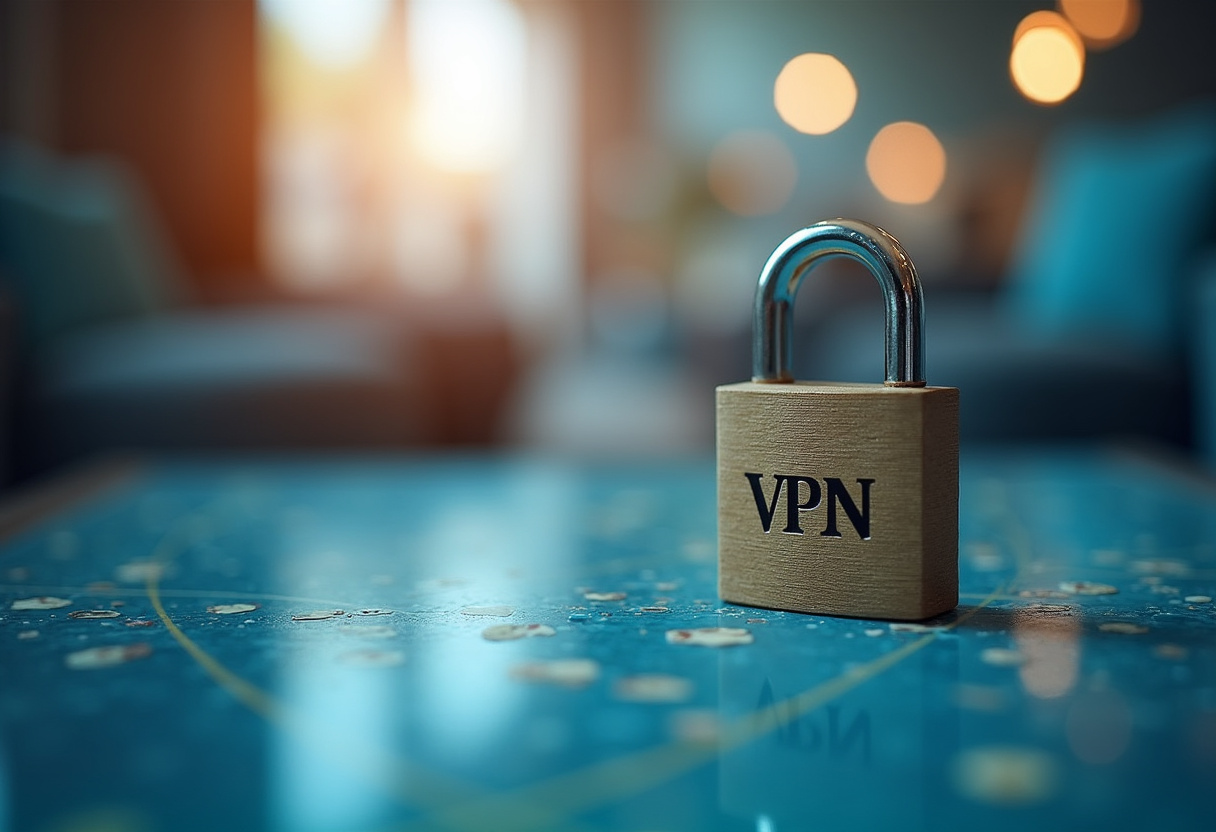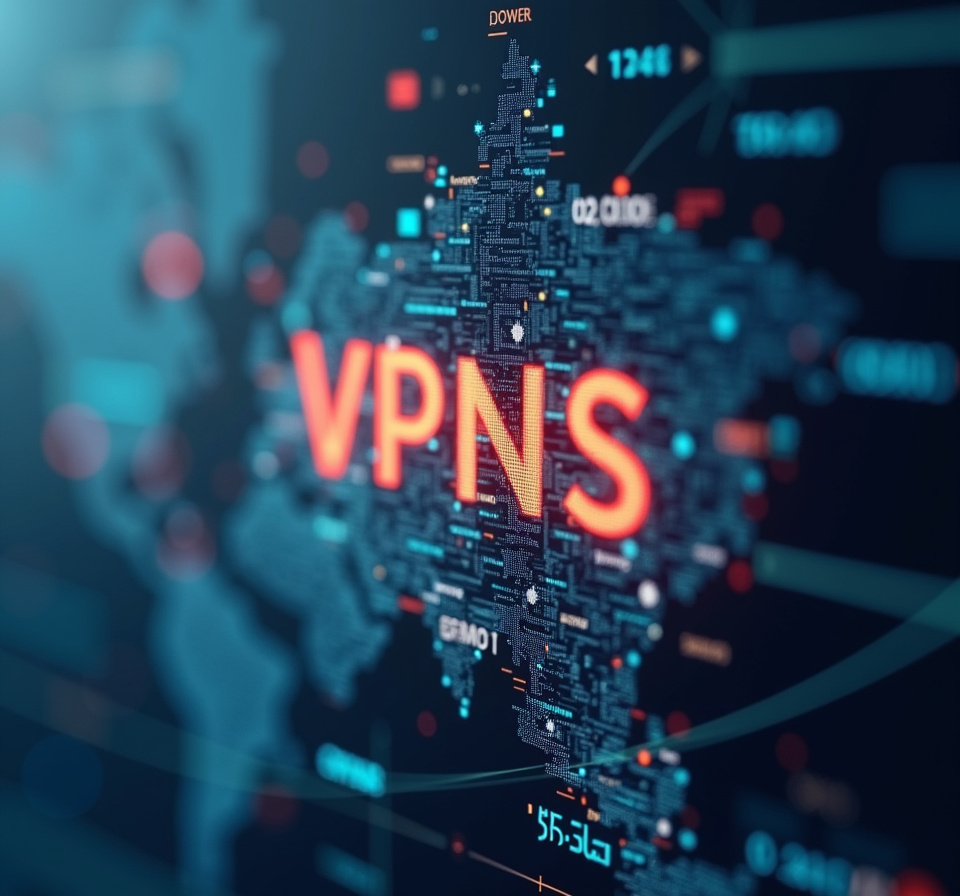VPNs for Travel Agencies: Securing Client Itineraries and Bookings

Table of Contents
travel agency VPN
In the fast-evolving realm of travel, agencies are handling vast quantities of sensitive information, from client names and addresses to passport details and credit card numbers. This makes them prime targets for cybercriminals seeking to exploit vulnerabilities and steal valuable data. A single breach can have catastrophic consequences, leading to significant financial losses, reputational damage, and a loss of client trust that can take years to rebuild.
Therefore, robust cybersecurity measures are no longer optional; they are an essential investment for any travel agency that wants to thrive in the digital age. Among the various tools available to enhance security, Virtual Private Networks (VPNs) stand out as a powerful and versatile solution. A provides a secure and encrypted connection between the agency's devices and the internet, effectively shielding sensitive data from prying eyes and mitigating the risk of cyberattacks.
This is especially crucial when dealing with travel itineraries and booking details, which often contain a wealth of personal and financial information that needs to be carefully protected. Think of a VPN as creating a private, secure tunnel through the public internet. All data transmitted through this tunnel is encrypted, meaning it's scrambled into an unreadable format, making it virtually impossible for hackers to intercept and decipher the information.
This encryption process ensures that even if someone manages to intercept the data, they won't be able to make sense of it without the correct decryption key. The importance of encryption can't be overstated, particularly when dealing with sensitive client information. Without encryption, data transmitted over the internet is vulnerable to eavesdropping and interception.
This means that hackers could potentially intercept your emails, access your booking systems, and steal your clients' personal and financial information. By using a VPN, you can encrypt all of your data transmissions, ensuring that your clients' information remains secure and confidential. Beyond simple encryption, a offers a suite of additional benefits that can significantly enhance a travel agency's security posture.
One key advantage is the ability to mask the agency's IP address, which is a unique identifier assigned to every device that connects to the internet. By concealing the IP address, a VPN makes it more difficult for hackers to track the agency's online activity and identify its location. This can help to prevent targeted attacks and protect the agency from surveillance.
Consider the scenario where a travel agency is based in a location with high cybersecurity risks. By using a VPN, the agency can connect to a server in a different country, effectively changing its virtual location and masking its true IP address. This makes it harder for hackers to target the agency based on its location and reduces the risk of being subjected to geographically targeted cyberattacks.
In addition to protecting against external threats, a VPN can also help to prevent internal data breaches. By encrypting all data transmitted within the agency's network, a VPN makes it more difficult for employees to access sensitive information without authorization. This is particularly important in organizations with a large number of employees, where the risk of internal data breaches is higher.
Furthermore, a VPN can provide secure access to geo-restricted content, allowing travel agents to research and book travel arrangements in regions where access might otherwise be limited. For example, a travel agent based in North America could use a VPN to connect to a server in Europe and access airline websites or booking platforms that are only available to European users. This ensures that they have access to the widest range of options and can find the most suitable itineraries for their clients.
In conclusion, the implementation of a is a critical step in protecting sensitive client data, securing booking transactions, and mitigating the risk of cyberattacks. By creating a secure and encrypted connection, masking the agency's IP address, and providing secure access to geo-restricted content, a VPN can significantly enhance a travel agency's security posture and build client trust. In an era where data breaches are becoming increasingly common, investing in a VPN is not just a best practice; it's a necessity for any travel agency that wants to thrive in the digital age.
This proactive approach greatly improves and bolsters measures, whilst simultaneously instilling confidence through enhanced
itinerary security
The specific advantages of integrating a VPN into the daily operations of a travel agency are multifaceted, and address critical areas of concern. Foremost is . Travel itineraries often contain highly sensitive information, including flight details, hotel reservations, passport numbers, credit card details and personal addresses.
If this information falls into the wrong hands, it can lead to identity theft, financial fraud, and even physical harm. A VPN encrypts all data transmitted between the travel agency's devices and the internet, making it virtually impossible for hackers to intercept and decipher this information. Whether the agency is accessing flight booking systems, hotel reservation portals, or online payment gateways, a VPN ensures that the data remains protected from unauthorized access.
This is particularly important when travel agents are working remotely or using public Wi-Fi networks, which are notoriously insecure. Public Wi-Fi networks are often targeted by hackers who set up fake hotspots to steal login credentials and other sensitive information. By using a VPN, travel agents can connect to public Wi-Fi networks without exposing their data to risk.
The encrypted connection protects their data from being intercepted by hackers, ensuring that client itineraries and booking details remain secure. Secondly, is paramount. The online booking process typically involves the exchange of highly sensitive financial information, such as credit card numbers, bank account details, and security codes.
A VPN encrypts this data, preventing hackers from intercepting it and using it for fraudulent purposes. This is particularly critical when travel agents are booking flights, hotels, and car rentals online. The use of a VPN provides an extra layer of security, protecting both the agency and its clients from financial losses.
Furthermore, a VPN can help travel agencies avoid phishing scams, which are a common tactic used by cybercriminals to steal sensitive information. Phishing emails often mimic legitimate travel websites or booking platforms, tricking travel agents into entering their login credentials or financial details. By using a VPN, travel agencies can protect themselves from these scams, as the encrypted connection makes it more difficult for hackers to intercept their data.
Consider a scenario where a travel agent receives a phishing email that appears to be from a reputable airline, offering a special discounted fare. The email directs the agent to a fake website that looks identical to the airline's official website. If the agent enters their login credentials or financial details on this fake website, their information will be stolen by the hackers.
However, if the agent is using a VPN, the encrypted connection will help to protect their data from being intercepted, even if they accidentally visit the fake website. In addition to protecting against external threats, a VPN can also help to prevent internal data breaches. By encrypting all data transmitted within the agency's network, a VPN makes it more difficult for employees to access sensitive information without authorization.
This is particularly important in organizations with a large number of employees, where the risk of internal data breaches is higher. For instance, a disgruntled employee might attempt to steal client itineraries or booking details to sell to a competitor. By using a VPN, authorized access is ensured and minimizes the risk.
The implementation of a VPN can also help to improve the overall security posture of the travel agency. By encrypting all data transmissions, a VPN makes it more difficult for hackers to gain access to the agency's network and steal sensitive information. This can help to reduce the risk of data breaches and other cybersecurity incidents.
Beyond itinerary and booking security, a VPN is vital for maintaining . In an era of heightened awareness about data protection, clients are increasingly demanding that their personal information is handled securely and responsibly. They expect travel agencies to take appropriate measures to protect their data from unauthorized access and disclosure.
The use of a VPN demonstrates a commitment to client data privacy, which can help to build trust and loyalty. By encrypting data transmissions and masking IP addresses, VPNs contribute significantly to safeguarding and promoting trust.
itinerary security
The failure to adequately protect client data can have severe consequences, including reputational damage, financial losses, and legal penalties. A VPN helps travel agencies comply with data protection regulations by encrypting data transmissions and masking IP addresses, ensuring that sensitive information is protected from unauthorized access and disclosure. Regulations like the General Data Protection Regulation (GDPR) in Europe and the California Consumer Privacy Act (CCPA) in the United States impose strict requirements on businesses regarding the collection, storage, and use of personal data.
These regulations also grant individuals significant rights over their data, including the right to access, correct, and delete their information. Travel agencies that fail to comply with these regulations can face hefty fines, reputational damage, and legal action. By implementing a VPN, travel agencies can demonstrate a commitment to data protection and reduce the risk of non-compliance.
The encrypted connection provided by a VPN helps to ensure that personal data is protected from unauthorized access and disclosure, which can help to meet the requirements of GDPR and CCPA. Moreover, the ability to mask IP addresses can help to protect the privacy of clients, as it prevents their online activity from being tracked and monitored. Beyond regulatory compliance, a VPN can also help travel agencies to enhance their competitive advantage.
In an era where consumers are increasingly concerned about data privacy, a travel agency that prioritizes security and privacy can differentiate itself from its competitors. Consumers are more likely to choose a travel agency that they trust to protect their personal information. By clearly communicating their security practices to clients, including the use of VPNs, travel agencies can build trust and loyalty.
This can lead to increased bookings, positive word-of-mouth referrals, and a stronger brand reputation. To effectively implement a VPN, travel agencies need to carefully consider their specific needs and requirements. Factors such as the size of the agency, the number of employees, the types of data handled, and the level of security required should all be taken into account.
It's also important to choose a VPN that is reliable, secure, and easy to use. The VPN should offer strong encryption protocols, a wide range of server locations, and a user-friendly interface. Regular security audits and updates are also essential to ensure that the VPN remains effective against evolving cyber threats.
Employee training is another crucial aspect of VPN implementation. Travel agents need to be educated about the importance of cybersecurity and how to use the VPN effectively. They should also be trained to recognize and avoid phishing scams and other cyber threats.
By investing in employee training, travel agencies can empower their employees to be active participants in their cybersecurity efforts. Furthermore, it's important to establish clear policies and procedures for VPN usage. These policies should outline who is authorized to use the VPN, how it should be used, and what types of data should be protected.
Regular monitoring of VPN usage can also help to identify potential security risks and ensure compliance with policies. This monitoring can identify unusual login attempts, excessive data usage, or connections from unusual locations. Early detection of such anomalies can provide a window of opportunity to remediate threats that could compromise or .
In summary, a carefully planned and well-executed VPN implementation strategy is essential for travel agencies that want to protect their client data, comply with data protection regulations, and enhance their competitive advantage. By choosing a reliable VPN, training employees, and establishing clear policies and procedures, travel agencies can create a secure and privacy-conscious environment for their clients and employees. This proactive approach to cybersecurity will not only safeguard sensitive information but will also build trust, enhance reputation, and contribute to the long-term success of the business, solidifying as a core value.
itinerary security
Choosing the right VPN for a travel agency involves a careful evaluation of several key factors. Not all VPNs are created equal, and selecting one that aligns with the specific needs and operational requirements of the agency is crucial for maximizing its effectiveness. The first and foremost consideration is the level of security offered by the VPN.
Strong encryption protocols, such as AES-256, are essential for protecting data from unauthorized access. The VPN should also have a strict no-logs policy, meaning that it does not collect or store any data about user activity, browsing history, or IP addresses. This ensures that even if the VPN server is compromised, no sensitive information about the agency's activities can be revealed.
Another important factor to consider is the number and location of servers offered by the VPN provider. A wide range of server locations allows travel agents to connect to servers in different countries, which can be useful for accessing geo-restricted content and bypassing price discrimination. The number of servers available also affects the speed and reliability of the VPN connection.
A VPN with a large number of servers is less likely to experience congestion and slowdowns. The speed of the VPN connection is particularly important for travel agencies, as they often need to access data-intensive applications and services, such as online booking platforms and video conferencing tools. A slow VPN connection can significantly impact productivity and frustrate employees.
Therefore, it's essential to choose a VPN that offers fast and reliable connections. User-friendliness is another important consideration, particularly for travel agencies with employees who are not technically savvy. The VPN should have a user-friendly interface that is easy to navigate and understand.
It should also offer helpful tutorials and support resources to assist users with setup and troubleshooting. The availability of customer support is also crucial, particularly for travel agencies that operate 24/7. The VPN provider should offer reliable customer support via email, phone, or live chat.
The support team should be knowledgeable, responsive, and able to quickly resolve any issues that may arise. The cost of the VPN is also a factor to consider. While it's tempting to choose the cheapest option, it's important to remember that you often get what you pay for.
Free VPNs may not offer the same level of security, speed, and reliability as paid VPNs. They may also collect and sell user data to third parties. Therefore, it's generally advisable to choose a paid VPN from a reputable provider.
Mobile VPN capabilities are essential. Travel agents often work remotely and need to access sensitive information on their mobile devices. The VPN should offer mobile apps for iOS and Android devices, allowing travel agents to securely connect to the agency's network from anywhere in the world.
These apps should be easy to use and offer the same level of security and functionality as the desktop version. Additional features, such as a kill switch, can also enhance security. A kill switch automatically disconnects the internet connection if the VPN connection drops, preventing data from being transmitted over an insecure network.
This feature is particularly useful for travel agents who work in public places or on unreliable Wi-Fi networks. Furthermore, split tunneling is a beneficial feature to look for. Split tunneling allows travel agents to choose which traffic is routed through the VPN and which traffic is routed directly to the internet.
This can improve performance for non-sensitive applications, such as streaming video or browsing social media. By carefully considering these factors and selecting a VPN that meets their specific needs, travel agencies can significantly enhance their security posture and protect their client data from cyber threats, further strengthening and solidifying protocols. The right choice underscores a robust commitment to , earning trust and fostering long-term relationships.
client data privacy
Beyond the technical aspects of VPN selection and implementation, a crucial element in ensuring the success of a VPN strategy for travel agencies lies in cultivating a security-conscious culture within the organization. Technology alone cannot guarantee complete protection; it must be complemented by a human element, where employees are aware of cybersecurity risks and actively participate in maintaining a secure environment. This begins with comprehensive training programs designed to educate travel agents about common cyber threats, such as phishing scams, malware attacks, and social engineering tactics.
The training should emphasize the importance of data privacy and security, and it should provide practical guidance on how to identify and avoid these threats. Employees should be taught how to recognize suspicious emails, how to create strong passwords, and how to protect their devices from malware. Regular refresher courses and updates are also essential to keep employees informed about the latest threats and security best practices.
Phishing simulations, where employees are subjected to realistic phishing emails, can be an effective way to test their awareness and identify areas where further training is needed. The results of these simulations should be used to tailor training programs and address specific vulnerabilities. A strong password policy is another essential component of a security-conscious culture.
Employees should be required to create strong, unique passwords for all of their accounts, and they should be prohibited from sharing their passwords with others. Password managers can be a useful tool for helping employees to create and manage their passwords securely. Regular password audits should be conducted to identify weak or compromised passwords.
Clear policies and procedures for handling sensitive data are also crucial. These policies should outline how data should be collected, stored, used, and protected. Employees should be trained on these policies and procedures, and they should be held accountable for adhering to them.
The policies should also address the use of personal devices for work purposes. If employees are allowed to use their own devices, they should be required to install security software and adhere to the agency's security policies. Regular security audits and assessments can help to identify vulnerabilities and ensure that security measures are effective.
These audits should be conducted by qualified security professionals, and they should cover all aspects of the agency's IT infrastructure, including its networks, servers, and applications. The results of these audits should be used to improve security controls and address any identified weaknesses. Furthermore, a well-defined incident response plan is essential for dealing with security breaches.
This plan should outline the steps to be taken in the event of a breach, including how to contain the breach, how to investigate the cause, and how to notify affected parties. The incident response plan should be regularly tested and updated to ensure that it is effective. Creating a culture of open communication about security is also important.
Employees should be encouraged to report any suspicious activity or security concerns to their supervisors or IT department. A “no-blame” policy should be in place to encourage employees to report incidents without fear of reprisal. This fosters an environment where security is everyone's responsibility, and where employees are empowered to actively participate in protecting the agency from cyber threats.
By fostering a security-conscious culture, travel agencies can significantly reduce their risk of data breaches and other cybersecurity incidents. This, in combination with a robust VPN strategy, provides a multi-layered approach to protecting sensitive client data, securing booking transactions, and promoting . The synergy between technology and human awareness creates a powerful defense against cyber threats, bolstering and reinforcing .
By prioritizing security and privacy, travel agencies can build trust with their clients, enhance their reputation, and gain a competitive advantage in the marketplace. This investment in security is an investment in the long-term success and sustainability of the business.
Stay Updated
Get the latest VPN news, tips, and exclusive deals to your inbox.




